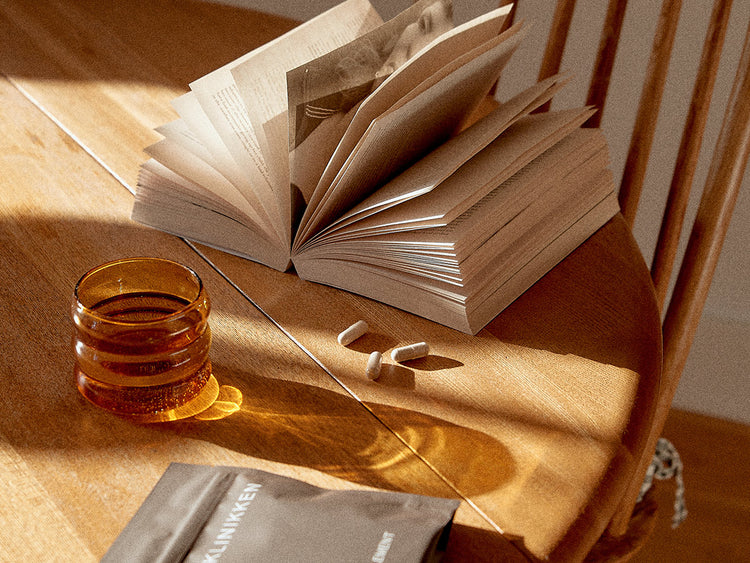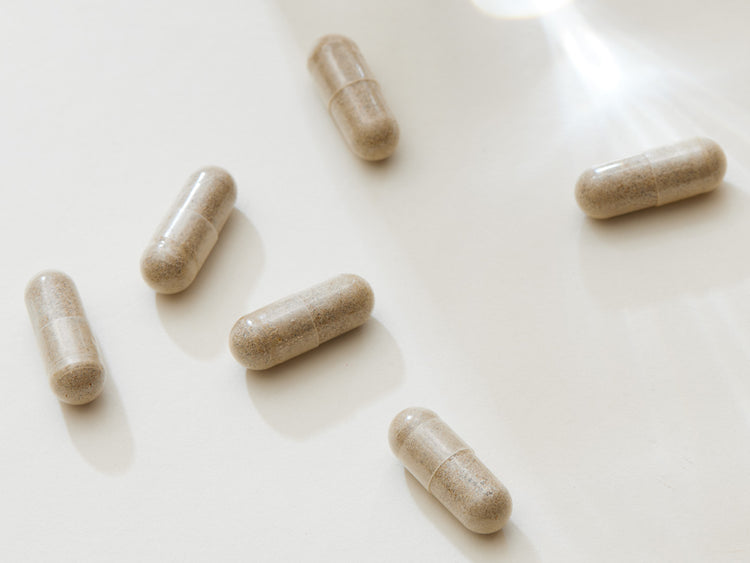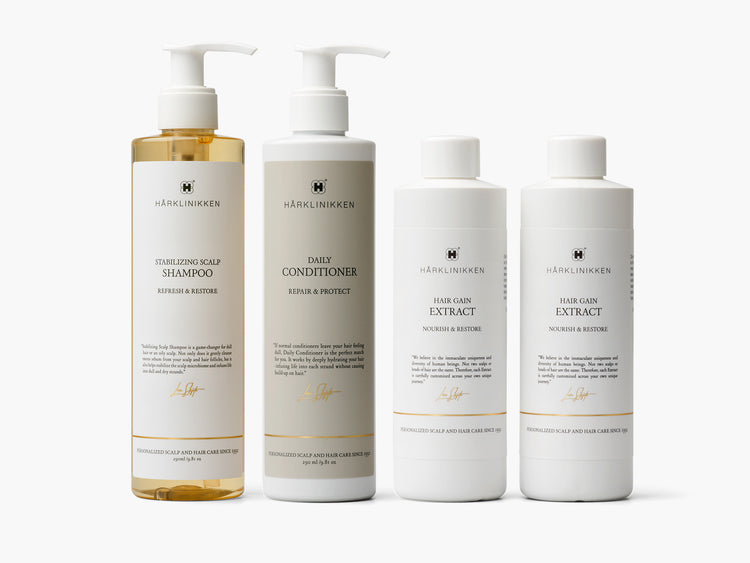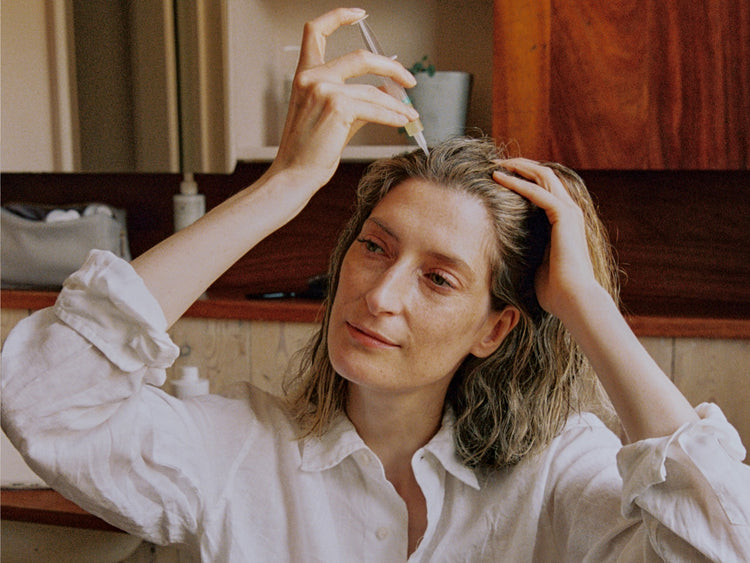During winter many of us laser-focus on our skincare routines: increasing use of lip masks, hydrating serums, moisturisers, body oils and more to combat dehydrated, dry, and dull skin. But our scalp and hair need just as much attention as temperatures begin to drop. The winter months can wreak havoc on the scalp (leaving it dry and irritated or overly greasy), while hair often becomes more brittle, dull, and lifeless. Thanks to Hårklinikken’s decades of experience and clinical research in Denmark and Iceland, we have learned the damage cold weather can do to hair and scalp health – as well as plenty of solutions.
Common Cold Weather Hair and Scalp Issues
Winter can bring a lack of humidity, frigid winds, and flurries of snow – all of which can affect your scalp and your hair in numerous ways.
Dry, itchy scalp
Reduced humidity that comes with cold weather can result in the scalp becoming more prone to dryness and irritation as the top layers of the scalp can be damaged by the weather and lose hydration. Intense indoor heating can also throw off the scalp’s microenvironment, further exacerbating the issue. People prone to dry scalps may even notice white flakes in their hair that may be exacerbated when scratching the scalp.
Greasy scalp and buildup
Conversely, some individuals may experience increased buildup on their scalp during winter. This can be due to your sebum production increasing (sometimes overcompensating for dryness) wearing hats more often, less frequent cleansing. Spending time in overly heated indoor spaces and wearing super-snug hats can cause the head to be damp for longer periods at a time, and more than usual. That, coupled with the myth that we should shampoo less frequently during the colder months can result in increased scalp buildup. One typical issue that can arise is seborrheic dermatitis, which is an overgrowth of Malassezia yeast that triggers inflammation, causing changes in the skin. The first sign is flaky skin on the scalp as well as potentially behind the ears, on the face and in areas where skin fold, and it can be especially stubborn when scalp is oily.
Brittle, dry hair
Freezing winds, a lack of humidity and increased indoor heating can also impact the lengths of your hair. The result is dried out, brittle strands with fragile bonds, making them more prone to breakage, tangles and frizz. Dry hair can also appear dull and lack shine.
How to Treat Dry Scalp and Hair in Cold Weather
We can efficiently mitigate these common scalp and hair issues by taking extra care and adding a few steps to our daily and weekly routine.
Use leave-in conditioner
Our leave-in Hair Hydrating Crème, applied to damp or dry hair, can function similarly to how a chapstick works for lips. Consistent use will help repair damaged hair strands and return lustre. Consider carrying our small, travel-sized version to hydrate and tame fly-aways while on the go.
Apply a deep-conditioning mask once or twice a week
We recommend using our Hair Mask once or twice a week to help restore moisture to the strands. Keeping up this routine during the colder months helps reduce breakage, returning elasticity, softness, and shine to your strands.
Frequently cleanse your scalp, even in winter
No matter the season, it’s important to keep a balanced scalp environment for healthy hair growth. We recommend our Balancing and Stabilizing shampoos with a gentle and yet effective cleansing formulation that won't strip or dry your scalp but will help balance its pH level and regulate excessive sebum production, minimising scalp issues like excessive buildup and seborrheic dermatitis.
Reduce use of hot styling tools
Hot tools – whether blow dryers, curling wands, straighteners or others – should be high-quality and used sparingly on medium-to-low heat. When blow drying, always select the low to medium heat setting and work in small sections, pointing the nozzle downward along the hair shaft to avoid damaging the cuticle. Make sure to use a heat protectant when using any hot tool and never use them on drenched hair.
Don’t go out with wet hair in cold weather
Leaving the house with wet hair in winter can do your strands and scalp harm. Not only is hair most vulnerable when wet, but water molecules expand in cooler temperatures, leaving the hair stiff and prone to breakage. The scalp is also more delicate when wet and significant temperature changes can disrupt the scalp surface, leading to irritation. Let your hair air dry or blow dry on a low heat setting before heading out into the winter weather.
Wear a winter hat, but not all the time
Hats can provide protection from harsh winds, rain, and snow, but they can sometimes cause imbalance to your scalp health – especially if you’re prone to an oily scalp. Because hats trap your body heat close to your scalp, they can increase oil production and yeast overgrowth. It’s important to take a break from wearing your winter hat. If you’re wearing the same one daily, make sure to wash it regularly.
Consider a humidifier in cold weather
Investing in a humidifier can help maintain a balanced moisture level in the air to tackle dryness from indoor heating. Consider keeping one near your bed or in the room where you spend the majority of your time.
Hårklinikken Products For Winter
Hair Mask
Typically used as a leave-in treatment twice a week, the Hair Mask’s nourishing formula contains jojoba and Abyssinian oils blended with powerful constituents derived from quinoa and flaxseed. Made using our unique hydration technology, it infuses powerful ingredients into each strand to help seal in moisture, protect the hair and minimise damage.
Hair Hydrating Crème
This leave-in conditioner can be applied to damp or dry hair. Organic argan and sunflower seed oils will dramatically improve hair’s texture, lustre and elasticity with frequent use. It also serves as an excellent heat protectant before blow-drying or using other hot styling tools.
Balancing Shampoo
Formulated with mustard seed oil, our Balancing Shampoo cleanses the scalp from oil and product buildup while strengthening hair. Unlike many shampoos on the market that can leave your hair dry and your scalp feeling tight or irritated, this formula provides a cleanse that’s gentle enough to use daily.
Fortifying Shampoo
Formulated with aloe vera, our Fortifying Shampoo is an add-on product to help protect and hydrate hair, making it an excellent choice for people with dry or damaged strands.

Ready to Improve Your Scalp & Hair Health?
Our Hair Supplement is designed to promote stronger, fuller, healthier hair growth and is part of the entire Hårklinikken scalp and hair care system.
Unsure where to start? Book an in-person consultation or take the virtual Hair Assessment.






